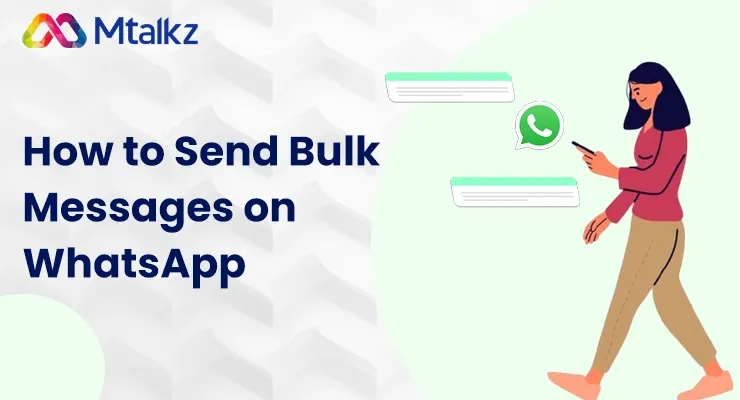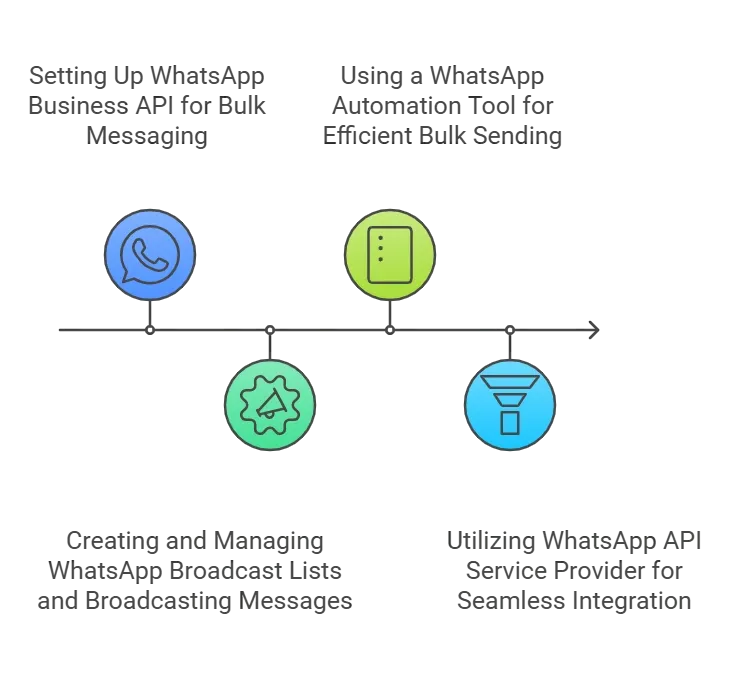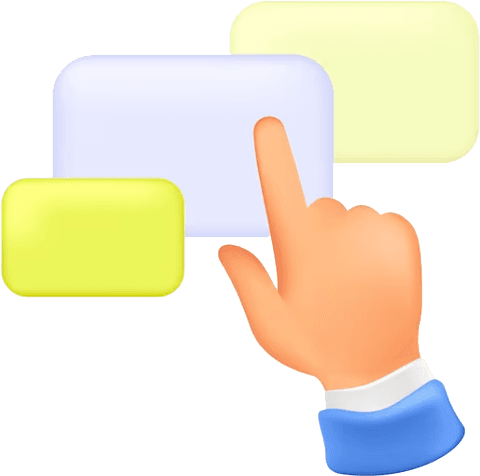
How to Send Bulk Messages on WhatsApp
Learn how to send bulk WhatsApp messages using the WhatsApp Business API with step-by-step instructions and best practices.
Yogesh Mishra
•Bulk Messaging on WhatsApp
Reaching a large audience efficiently is essential for businesses aiming to grow their customer base. Learning how to send bulk messages on WhatsApp allows you to send messages to thousands of customers or audience simultaneously, saving time and effort while ensuring that their message reaches customers where they are most active.
By using WhatsApp for bulk messaging, you and your business can benefit from high engagement rates, as users are more likely to read messages on WhatsApp than on email or SMS. Additionally, WhatsApp allows businesses to send rich media, like images, videos, and documents, enhancing the message’s impact.
You can leverage WhatsApp’s bulk messaging capabilities through the WhatsApp Business API and automation tools, which streamline the process and enable personalized communication at scale.
This makes it a powerful solution for marketing campaigns, customer updates, transactional messages, and more.
How to send WhatsApp Messages in Bulk | Mtalkz Omni Platform WhatsApp Broadcast Video Tutorial
[embed]https://youtu.be/pCE91lpnUjk?si=U9r7e7W_wI-e9khG[/embed]
What is Bulk Messaging on WhatsApp?
Bulk messaging on WhatsApp refers to the practice of sending a large number of messages to multiple recipients simultaneously. This is typically done using the WhatsApp Business API or third-party messaging platforms that integrate with WhatsApp.
Messages can be promotional, transactional, or informational, and they enable businesses to engage with their audience quickly and effectively.
Difference Between Personal WhatsApp Messaging and Business Bulk Messages
Personal WhatsApp messaging is intended for individual, private communication, where you can send messages to friends, family, or specific contacts. It is not designed for reaching out to large groups of people for business purposes.
On the other hand, business bulk messages are used by businesses to send messages to multiple customers at once. These messages can include marketing promotions, updates, reminders, and customer service communications.
Role of WhatsApp Business API in Bulk Messaging
The WhatsApp Business API plays a crucial role in enabling businesses to send bulk messages at scale. Unlike the standard WhatsApp app, the Business API allows businesses to automate the sending of messages, personalize communications, and integrate with other systems, such as CRMs or marketing platforms.
The API supports features like message templates, media attachments, and interactive buttons, making it a versatile tool for customer engagement.
Businesses can use the API to create broadcast lists, send transactional notifications, or run promotional campaigns. It ensures that messages are delivered effectively, at scale, and in compliance with WhatsApp’s business policies.
Understanding the WhatsApp Business API
The WhatsApp Business API is a powerful tool designed for medium and large businesses to communicate with their customers at scale.
Unlike the standard WhatsApp or WhatsApp Business app, the API enables businesses to send bulk messages, automate communication, and integrate with other business systems, making it ideal for marketing, customer support, and transactional notifications.
Key Features of WhatsApp Business API
Automation
With the WhatsApp Business API, businesses can automate message sending, ensuring quick responses to customer inquiries and efficient bulk message delivery. This reduces manual effort and enhances operational efficiency.
Integration
The API allows seamless integration with CRM systems, marketing platforms, and chatbots. This makes it easier to track customer interactions and create personalized marketing campaigns.
Personalization
The API supports message templates that can be customized, allowing businesses to send tailored messages to different customer segments, improving engagement and conversion rates.
Benefits of Using WhatsApp Business API for Bulk Messaging
Scalability
The WhatsApp Business API enables businesses to send bulk messages to large customer bases without compromising on delivery speed or quality.
Cost-Effective
By using WhatsApp as a communication channel, businesses can reduce costs compared to traditional marketing methods like SMS or email.
Higher Engagement
WhatsApp has a high open rate, meaning that bulk messages sent through the API are more likely to be seen and acted upon by recipients, leading to better engagement.
In short, the WhatsApp Business API is a crucial tool for businesses looking to scale their messaging efforts efficiently while maintaining a high level of personalization and customer engagement.
Steps to Send Bulk Messages on WhatsApp

Sending bulk messages on WhatsApp requires a well-defined process to ensure effective communication and compliance with WhatsApp’s policies. Here’s a step-by-step guide to help businesses set up and send bulk messages using the WhatsApp Business API.
1. Setting Up WhatsApp Business API for Bulk Messaging
Before sending bulk messages, you need to set up the WhatsApp Business API. Here’s how:
Register with WhatsApp Business
First, you need to apply for WhatsApp Business API access. This requires your business to be verified and approved by WhatsApp, which includes creating a WhatsApp Business profile with necessary details such as your company name and business information.
Choose a WhatsApp API Service Provider
If you’re not tech-savvy, it’s easier to work with an API service provider who will handle the technical aspects of API integration.
They will set up the WhatsApp Business API and manage API credentials, including the phone number you will use to send messages.
You can directly call our WhatsApp experts at +91-9868629924 to get a free consultation.
Get API Credentials
Once approved, you’ll receive API credentials like an API key and a phone number. These are essential for making API calls and sending messages from your business account.
2. Using a WhatsApp Automation Tool for Efficient Bulk Sending
An automation tool makes it easier to send bulk messages by allowing you to automate repetitive tasks and manage large-scale campaigns more efficiently. Here’s how automation helps:
Message Scheduling
You can schedule bulk messages to be sent at specific times, ensuring messages reach your audience when they are most likely to be engaged.
Automated Responses
Automation tools enable you to set up auto-replies or interactive flows, allowing you to engage users automatically with quick replies, personalized messages, or even pre-programmed chatbots.
Message Personalization
Automation tools often allow you to create dynamic messages using variables (like customer names or transaction details), which makes your messages feel more personal and relevant.
3. Creating and Managing WhatsApp Broadcast Lists and Broadcasting Messages
WhatsApp Broadcast Lists allow businesses to send messages to multiple recipients without creating a group. Here’s how to set it up:
Create Broadcast Lists
In the WhatsApp Business API, you can create and manage broadcast lists that segment your audience into categories based on their preferences or interactions. Each list can target a specific customer group, making your messages more relevant.
Broadcasting Messages
Once your list is ready, you can use the API to send broadcast messages. These are one-to-many messages where recipients receive the message individually, preserving privacy and improving engagement.
Comply with WhatsApp Policies
It’s important to note that WhatsApp enforces strict guidelines for bulk messaging. For example, your messages should be opt-in (meaning the recipients must have agreed to receive messages from you).
Additionally, you must follow the rules for template messages (pre-approved message formats) for promotional content.
4. Utilizing WhatsApp API Service Provider for Seamless Integration
To send bulk messages at scale, you may need the help of a WhatsApp API service provider for seamless integration. They will ensure smooth implementation of the API and help you scale your efforts with the following services:
Platform Integration
API service providers can integrate WhatsApp with your existing CRM, marketing tools, or customer support software, enabling you to send personalized messages and automate workflows.
Advanced Analytics
API service providers often offer detailed reporting and analytics, so you can track message delivery, read rates, and engagement metrics. This helps refine your campaigns over time.
Custom Solutions
Some providers offer custom solutions like chatbots, which can interact with users automatically, ensuring a personalized experience at scale.
WhatsApp Bulk Broadcasting: Best Practices
Sending bulk messages via WhatsApp is a powerful tool for engaging your audience, but to make the most of it, businesses must follow best practices.
This ensures not only compliance with WhatsApp’s policies but also better results in terms of customer engagement and retention.
1. Importance of Crafting Personalized Messages
Personalization is key when it comes to WhatsApp broadcasts. While it may be tempting to send generic messages to a large audience, personalized messages help your business stand out and increase engagement. Here’s how:
Use Dynamic Content
Personalize each message with customer-specific details like their name, past purchases, or interests. Tools integrated with WhatsApp Business API can automate this process by using customer data to create personalized messages.
Address Customer Pain Points
Instead of sending generic promotions, address your customers’ pain points. Whether it’s a limited-time offer or a reminder based on their previous interactions, personalization helps build a stronger connection.
Tailor the Message Type
The message you send should align with your customer’s preferences. For example, sending a promotion to a customer who has previously purchased a specific product is more relevant and effective than a generic offer to everyone.
2. Understanding the Limitations and Restrictions of WhatsApp Broadcast Lists
WhatsApp Broadcast Lists are useful for reaching large numbers of customers, but they come with certain limitations that businesses must keep in mind:
Opt-in Requirement
WhatsApp mandates that recipients must have saved your business phone number in their contacts list to receive broadcast messages. This is to prevent unsolicited spam and ensure that messages are sent only to those who have agreed to receive them.
Message Delivery Limits
While WhatsApp doesn’t set explicit limits for broadcast messages, sending too many at once may result in your account being flagged for spam. It’s essential to stay within reasonable message limits, especially during high-volume campaigns.
No Group Chats
Unlike traditional groups, broadcast messages are sent individually, so recipients will never see each other’s responses or know who else is in the broadcast list. This ensures privacy but also means you can’t manage conversations in the same way you would in a group setting.
Template Messages
If you’re sending promotional or transactional messages, WhatsApp requires you to use pre-approved template messages. These templates ensure that your message complies with WhatsApp’s guidelines, especially regarding promotional content.

3. Tips for Targeting Specific Customer Segments with Bulk WhatsApp Broadcasts
When sending bulk messages, targeting the right audience is crucial. Here’s how to effectively segment and tailor your broadcasts:
Segment Your Audience Based on Behavior
Use customer data to create audience segments. For example, segment customers who have previously made purchases, those who have abandoned their carts, or those who have shown interest in specific product categories.
Leverage CRM and Marketing Tools
Integrating WhatsApp with your CRM or marketing tools helps you segment your audience more precisely. You can send customized offers based on purchase history, demographic data, or past interactions, ensuring that each customer receives a tailored message.
A/B Testing
Test different types of messages, subject lines, and offers to see what resonates best with your audience. By segmenting your lists and sending varied messages, you can improve engagement and optimize future campaigns.
Timing and Frequency
Be mindful of how often and when you send messages. Sending too many broadcasts within a short period can overwhelm your audience and lead to high opt-out rates.
Timing messages when your customers are most active can significantly improve engagement rates.
Using WhatsApp Marketing Automation for Bulk Messaging
WhatsApp marketing automation can significantly enhance the efficiency and effectiveness of bulk messaging campaigns. By automating repetitive tasks, businesses can focus more on strategy and customer engagement, ensuring consistent communication while saving valuable time and resources.
1. How WhatsApp Marketing Automation Can Streamline Bulk Messaging
Marketing automation on WhatsApp allows businesses to set up workflows that send messages to large groups of customers with minimal manual intervention. Here’s how it can streamline the process:
Scheduled Messaging
With automation, businesses can schedule WhatsApp broadcasts in advance. This ensures that messages are sent at optimal times, even outside business hours, without having to manually send them at the right moment.
Automated Campaigns
Automation tools can help run entire campaigns from start to finish. Whether it’s a welcome message for new customers, an abandoned cart reminder, or a seasonal promotion, automated campaigns ensure that all customers receive timely, consistent messages.
Drip Campaigns
A key advantage of WhatsApp marketing automation is the ability to set up drip campaigns, where messages are sent over a period of time to nurture leads or keep customers engaged. These can be pre-scheduled and triggered based on customer actions or other conditions.

Segmentation and Personalization
Automation can segment customers based on behavior, interests, or demographics, sending personalized messages to each group. This helps increase the relevance of each broadcast and boosts engagement.
2. Benefits of Integrating WhatsApp Chatbot Builder for Automated Responses
A WhatsApp chatbot builder can complement your bulk messaging strategy by providing real-time, automated responses to customer inquiries. Here are the benefits:
Instant Customer Support
A chatbot can respond to customer questions instantly, even during off-hours, ensuring that customers always receive assistance. This is especially helpful in managing high volumes of queries following a broadcast message or campaign.
Lead Qualification
Chatbots can qualify leads by asking a series of pre-set questions to gather essential information before passing the lead to a human agent. This can improve conversion rates by ensuring that only high-quality leads are followed up on.

24/7 Availability
With WhatsApp bots integrated into your marketing strategy, businesses can maintain customer engagement around the clock. This helps improve customer satisfaction and keeps the conversation flowing even when teams aren’t available to respond manually.

Automated Customer Journeys
Chatbots can guide customers through predefined journeys. Whether it’s providing additional product details, making a purchase, or answering FAQs, an automated chatbot ensures that your customer receives a personalized experience.
3. WhatsApp Marketing Software and Its Role in Running Campaigns
WhatsApp marketing software integrates with your WhatsApp Business API to run more sophisticated campaigns. Here’s how it plays a pivotal role in bulk messaging:
Campaign Management
Marketing software allows businesses to manage multiple WhatsApp campaigns simultaneously. You can create, track, and optimize campaigns directly through the software, ensuring better organization and more impactful results.
Analytics and Reporting
With marketing software, businesses can track the performance of each broadcast message. You’ll get insights into delivery rates, open rates, click-through rates, and engagement levels, helping you refine your strategy and improve future campaigns.

Template Management
WhatsApp marketing software provides access to a library of pre-approved message templates, helping businesses stay compliant while sending bulk messages.
Multi-User Access
Many WhatsApp marketing tools offer multi-user access, allowing different team members to collaborate on campaigns. This is especially useful for larger teams working on customer support, marketing, or sales functions, as it centralizes the communication process and reduces errors.
Customizable Workflows
The software often offers customizable workflows that align with specific business needs. Whether it’s sending a series of messages or automating customer follow-up, workflows can be tailored to meet your exact requirements.
Conclusion
In today’s digital landscape, bulk WhatsApp messaging offers businesses an effective way to communicate with large audiences quickly and efficiently.
By leveraging the WhatsApp Business API, you can automate messaging, personalize customer interactions, and run targeted campaigns that drive better results.
To get started, ensure you’ve set up your WhatsApp Business API and integrate a marketing automation tool for seamless broadcasting.
Don’t forget to adhere to best practices like segmenting your audience and crafting personalized messages for maximum impact.
Reach out to our experts for a free consultation or demo and discover how we can help you streamline your bulk messaging strategy.














